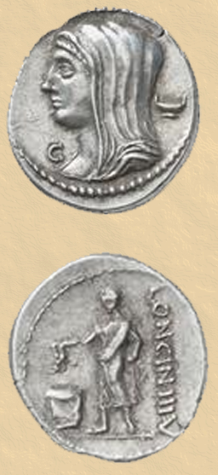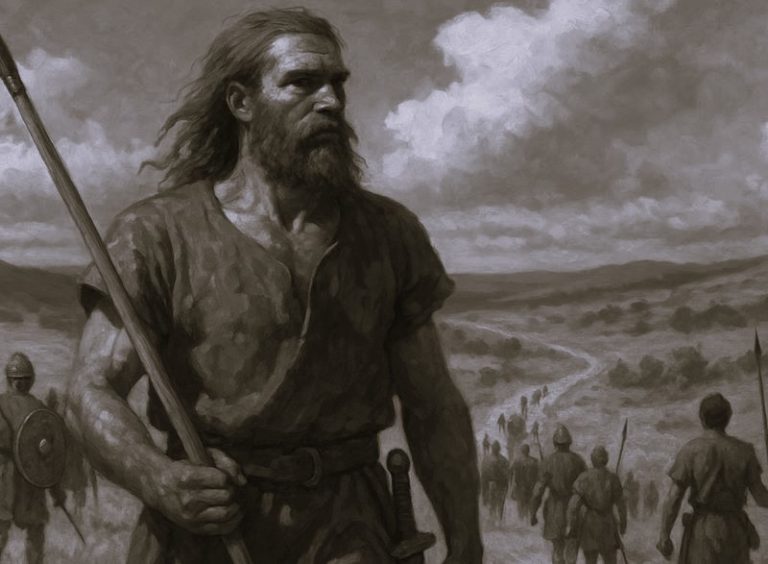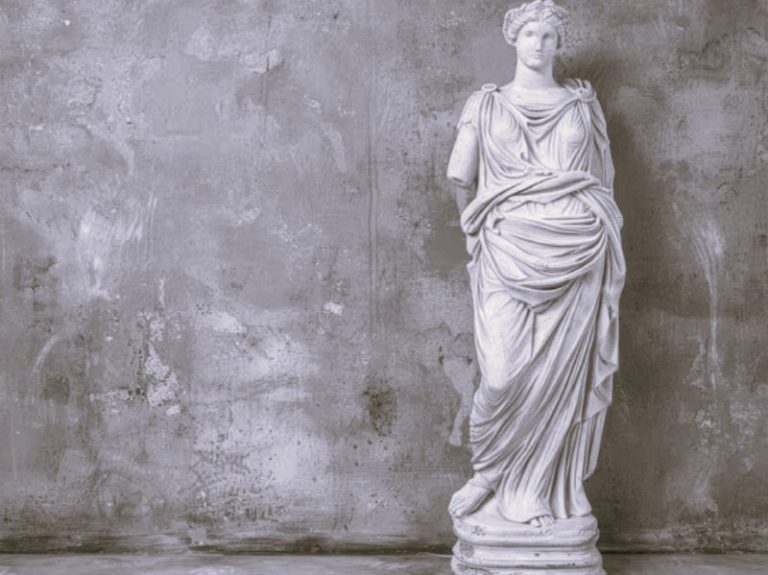


Curated/Reviewed by Matthew A. McIntosh
Public Historian
Brewminate
Quintus Servilius Caepio
Overview
Quintus Servilius Caepio was a Roman statesman and general, consul in 106 BC, and proconsul of Cisalpine Gaul in 105 BC. He was the father of Quintus Servilius Caepio and the grandfather of Servilia.
Consulship and Arausio
During his consulship in 106 BC, he passed a controversial law, with the help of the famous orator Lucius Licinius Crassus, by which the jurymen were again to be chosen from the senators instead of the equites.[1][2][3][4] However, it appears this law was overturned by a law of Gaius Servilius Glaucia in either 104 or 101 BC.

After his consulship, he was assigned to Gaul, where he captured the town of Tolosa, ancient Toulouse. There, he found some 50 thousand bars of gold and 10 thousand bars of silver which were legendarily stolen from the temple of Delphi by the Sordisci in the Gallic invasion of the Balkans in 279 BC.[5] The riches of Tolosa were shipped back to Rome, but only the silver made it; the gold was stolen by a band of marauders, who were rumoured to have been hired by Caepio himself.[5] The Gold of Tolosa was never found.
During the southern migration of the Cimbri in 105 BC, Caepio was assigned an army to defeat the migrating tribe. Also tasked to defeat the Cimbri was the consul for that year, Gnaeus Mallius Maximus, who was a novus homo (“new man”).[6] While the sitting consul outranked Caepio, Caepio refused to cooperate with the consul and his army.[6] Leading one of the two Roman armies into the Battle of Arausio, this refusal to cooperate with his superior officer, led to the destruction of both armies. Caepio refused to camp with Maximus and his troops; when the battle began, both Roman armies were overrun and defeated by the massively numerically superior Cimbri force, resulting in the deaths of some 60 to 80 thousand Roman soldiers.[7]
Exile
Upon his return to Rome, Caepio was stripped of his proconsulship by the Assembly.[8] A law proposed by Lucius Cassius Longinus stripped any person of his seat in the Senate if he had had his imperium revoked by the Senate. Based on this law, Caepio was stripped of his seat in the Senate.[8] Then, he was tried in the courts for the theft of the Tolosa gold, but with many senators on the jury, he was acquitted.[8]

He was then tried for “the loss of his army” by two tribunes of the plebs, Gaius Norbanus and Lucius Appuleius Saturninus. Despite being defended by the orator Lucius Licinius Crassus, Caepio was convicted,[9] and was given the harshest sentence allowable: he was stripped of his citizenship, forbidden fire and water within eight hundred miles of Rome, nominally fined 15,000 talents (about 825,000 lb) of gold, and forbidden to see or speak to his friends or family until he had left for exile. The huge fine — which greatly exceeded the amount in the Roman treasury — was never collected.
Two versions detail what happened thereafter: according to one, Caepio died in prison and his body, mangled by the executioner, was put on display on the Gemonian steps; however, according to the more commonly accepted version, he spent the rest of his life in exile in Smyrna in Asia Minor.[9] Historian Timagenes claimed that he was survived only by his daughters, if true, he must have passed after 90 BC since that was when his son Quintus was killed.[10]
Family
Caepio was likely married to a Caecilia Metella whom he had three children with, a son named Quintus Servilius Caepio as well as at least two daughters Servilia, the wife of Catulus and Servilia, the wife of Marcus Livius Drusus.[11] His wife may have been a daughter of Quintus Caecilius Metellus Macedonicus.[12]
The Battle of Arausio
Overview

The Battle of Arausio took place on 6 October 105 BC, at a site between the town of Arausio (now Orange, Vaucluse), and the Rhône River. Ranged against the migratory tribes of the Cimbri under Boiorix and the Teutoni under Teutobod were two Roman armies, commanded by the proconsulQuintus Servilius Caepio and consulGnaeus Mallius Maximus. However, bitter differences between the commanders prevented the Roman armies from co-operating, with devastating results. The terrible defeat gave Gaius Marius the opportunity to come to the fore and make radical reforms to the organisation and the recruitment of Roman legions. Roman losses are described as being up to 80,000 troops as well as another 40,000 auxiliary troops (allies) and servants and camp follower, virtually all of their participants in the battle. In terms of losses, the battle is regarded as one of the worst defeats in the history of ancient Rome.[13]
Prelude
The migrations of the Cimbri tribe through Gaul and adjacent territories had disturbed the balance of power and incited or provoked other tribes, such as the Helvetii, into conflict with the Romans. An ambush of Roman troops and the temporary rebellion of the town of Tolosa (modern Toulouse) caused Roman troops to mobilize in the area.
Having regained Tolosa, the proconsul Quintus Servilius Caepio adopted a defensive strategy, waiting to see if the Cimbri would move toward Roman territories again. On October 6th 105 BC, they did.
A Skirmish and Two Routs

Even before battle was joined, the Romans were in trouble. The senior of the year’s two consuls, Publius Rutilius Rufus, was an experienced and highly decorated soldier, veteran of the recent war in Numidia, but for some reason did not take charge of the military campaign himself but remained in Rome while his inexperienced, untried colleague Gnaeus Mallius Maximus led the legions north. The reasons for Rutilius not taking charge himself do not seem to be known: perhaps he faced political opposition because of his friendship with Gaius Marius, or perhaps he believed Mallius Maximus deserved the chance to earn himself a share of glory, or perhaps he was simply temporarily ill. Two of the major Roman forces available were camped out on the Rhone River, near Arausio: one led by Mallius Maximus, and the other by the proconsul Quintus Servilius Caepio. As the consul of the year, Maximus out-ranked Caepio and therefore should by law have been the senior commander of the combined armies.
The initial contact between the two forces occurred when a detached picketing group under the legate Marcus Aurelius Scaurus met an advance party of the Cimbri. The Roman force was completely overwhelmed and the legate was captured and brought before king Boiorix. Scaurus was not humbled by his capture and advised Boiorix to turn back before his people were destroyed by the Roman forces.
According to Mommsen, Caepio was presumably motivated into action by the thought that Maximus might be successful in negotiations and claim all the credit for a successful outcome; he launched a unilateral attack on the Cimbri camp on 6 October.[14] However, Caepio’s force was annihilated because of the hasty nature of the assault and the tenacity of Cimbri defence.
With a great boost in confidence from an easy victory, the Cimbri then proceeded to destroy the force commanded by Maximus. Already at a low ebb due to the infighting of the commanders, this Roman force had also witnessed the complete destruction of their colleagues. In other circumstances the army might have fled, but the poor positioning of the camp left them with their backs to the river. Many tried to escape in that direction, but crossing the river would have been difficult encumbered with armor. The number of Romans who managed to escape were very few. This includes the servants and camp followers, who usually numbered at least half as many again as the actual troops. Though the actual casualty figure remains debated, Livy claims that the total number of Roman casualties (not including camp followers or other non-combatants) amounted to 80,000.
Aftermath

Rome was a warlike nation and accustomed to military setbacks. However, the recent string of defeats ending in the calamity at Arausio was alarming for all the people of Rome. The defeat left them not only with a critical shortage of manpower and lost military equipment, but also with a terrifying enemy camped on the other side of the now-undefended Alpine passes. In Rome, it was widely thought that the defeat was due to the arrogance of Caepio rather than to a deficiency in the Roman Army.
The Cimbri next clashed with the Arverni tribe, and after a hard struggle set out for the Pyrenees instead of immediately marching into Italy.
The catastrophic scale of the loss, which cut a large swath through the ranks of aristocrats and commoners alike, inspired the Roman Senate and people to set aside the peacetime legal constraints that prevented a man from being consul a second time until ten years had passed since his first consulship, and to immediately propose and elect the highly skilled general Gaius Marius (despite his absence) as senior consul only three years after his first consulship.
Plutarch, in his Life of Marius, mentions that the soil of the fields the battle had been fought upon were made so fertile by human remains that they were able to produce “magna copia” (a great abundance) of yield for many years.
Appendix
Notes
- Cicero, de oratore 1.255
- Cicero, pro Cluentio 140
- Tacitus, Ann. xii. 60
- Duncan, Mike (2017). The Storm Before the Storm. New York: PublicAffairs. p. 120.
- Duncan 2017, p. 121.
- Duncan 2017, p. 125.
- Duncan 2017, p. 126.
- Duncan 2017, p. 134.
- Smith, William (1870). Dictionary of Greek and Roman biography and mythology. 1. Boston, Little. p. 535.
- Treggiari, Susan (2019). Servilia and her Family. Oxford University Press. p. 30.
- Treggiari, Susan (2019). Servilia and her Family. Oxford University Press. p. 68.
- Treggiari, Susan (2019). Servilia and her Family. Oxford University Press. p. 347.
- http://www.historyofwar.org/articles/battles_arausio.html
- Mommsen, Theodor; The History of Rome, Book IV
Originally published by Wikipedia, 02.26.2005, under a Creative Commons Attribution-ShareAlike 3.0 Unported license.






